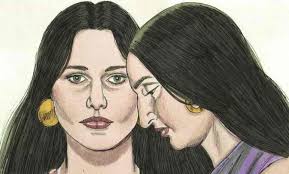Rachel’s Servant Bilhah Bore Jacob a Son
and Rachel Named Him Dan
30: 1-8
Rachel’s servant Bilhah bore Jacob a son and Rachel named him Dan DIG: How had barrenness continued to plague the line of Terah? How did Rachel take advantage of the Code of Hammurabi? Was it socially acceptable? Who was the mother legally? Who was Rachel’s struggle really with?
REFLECT: When have you felt like Rachel, unproductive, outnumbered, passed over or disgraced? How do you regain your spiritual perspective? Where do you go?
When Rachel saw that she was not bearing Jacob any children, she became jealous of her sister (30:1a), who by now had four children. It was obvious that the problem was not with Ya’akov. In her culture, this amounted to great shame and disgrace for a woman. No mention had been made earlier that Leah was jealous of Rachel’s lovely and shapely body, which attracted Jacob (Hebrew: Ya’akov). Now, however,Rachel is jealous of Leah’s womb.But instead of praying, either directly or through her husband, as Rebekah had done, she said to Ya’akov her husband: Give me children or I’ll die (30:1b). This battle for Jacob’s affection between two sisters was a sad spectacle. It evolved into a childbearing contest. It is ironic that Rachel, who believed she would die if she didn’t bear any children, and who is not satisfied with adopted children, dies while trying to bear a second child (35:16-19).476
The problem of barrenness continued to plague the line of Terah. Abraham’s response to Sarah’s barrenness started with prayer but ended with Ishmael and a multitude of problems. Isaac’s response to Rebecca’s barrenness was prayer. However, Jacob’s response to Rachel’s barrenness was anger and frustration. No doubt Jacob himself had been deeply disappointed that Rachel had not been able to bear children. He said: Am I in the place of God, who has kept you from having any children (30:2)? Ya’akov and Rachel loved each other dearly. But sometimes, when the cares of this world creep into a relationship, angry words and hurt feelings can result. We need to stay close to the Lord at all times, relying on Him, knowing that He loves us, believing that He knows what we need, and waiting on His timing. I know this is easier said than done, and we are all far from perfect, but if we stop relying on Him, scenes like this can become common place.
In 14:1 we were introduced to Amraphel king of Shinar, of Babylon. He is more commonly known today as Hammurabi. He lived eight hundred years before Moshe and developed a code of laws and ethics that became the standard from the Persian Gulf to the Caspian Sea and from Persia to the Mediterranean Sea. In this Code of Hammurabi, it was normal for a barren woman to substitute her maidservant as a surrogate mother, so she could have children and raise a family. Rachel had taken all the shame she could handle and took advantage of this law from the Code of Hammurabi.
In desperation, Rachel decided to resort to the expedient that had been followed by Sarah long ago, that of having children through her maidservant. It was an accepted social custom of the day. In fact, it is quite possible that it was for this very purpose, as a guard against barrenness, that Laban gave each of his daughters a maidservant. Humanly speaking, it was understandable and perhaps somewhat justifiable. Spiritually, however, it can only be regarded as a testimony to their lack of faith in God’s promises.477 It caused dissension for Abraham, and it will cause dissension for Jacob.

Then she said: Here is Bilhah, my maidservant. Sleep with her so that she can bear children for me and that through her I, too, can build a family (30:3). By the Code of Hammurabi, Rachel would name the children and be the legal mother, not her maidservant. So legally, she gave him her servant Bilhah as a wife (30:4a). But even though it was an acceptable practice in their day, it still had to be extremely difficult to give the man she loved to another woman. The fact that she gave him to her servant shows how desperate she was. Jacob raised no objection and slept with her and she became pregnant and bore him a son (30:4b-5). Each wife gave Jacob her maidservant in an effort to have more children than the other.478
Rachel, not Bilhah, names the boy because he was hers legally. Then Rachel said: God has judged me (NKJ). In this context, it signifies justice for someone in a hopeless position. He has listened to my prayer and has given me a son. Because of this she named him Dan, or yadin meaning he will judge (30:6). In one sense, the fact that he would provide justicewas fulfilled by Samson who was from the tribe of Dan. But in another sense, the tribe of Dan was also judged later in their history because of their spiritual adultery.
Pleased with the quick success of this arrangement, Rachel continued to have Jacob lie with Bilhah, now regarded as an actual wife of Ya’akov, though only a second-class wife, more like a concubine. She was soon pregnant again.479 Rachel’s servant Bilhah conceived again and bore Jacob a second son (30:7).
Then Rachel said: I have had a great struggle with my sister Leah, and I have prevailed (NKJ). In Hebrew, a great struggle is niftalee. So she named him Naphtali, meaning I have been entangled in a desperate struggle (30:8). Rachel’s struggle with Leah had actually been a struggle with God and for His favor. For Rachel knew that it was God who had closed her womb and opened Leah’s.480 At the moment, she thought that she had prevailed. Advantage Rachel.



Leave A Comment